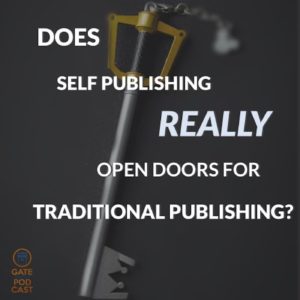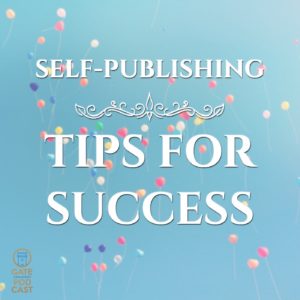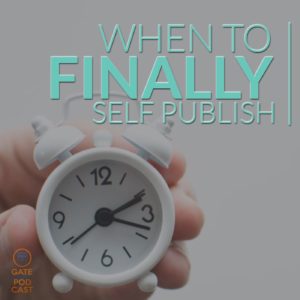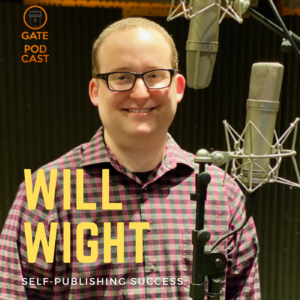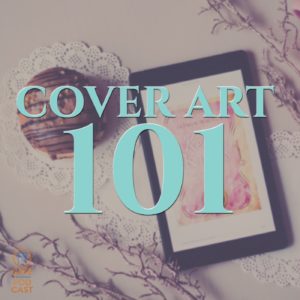- Agents
- Author News, Deals
- Awards
- Bad Poetry
- Blog News
- Books
- Career
- CBA
- Collaborating and Ghosting
- Conferences
- Current Affairs
- Deep Thoughts
- Favorite Books
- Featured
- Film
- Marketing and Platforms
- Proposals
- Publishing
- Questions from Beginners
- Quick Tips
- Religion
- Resources for Writing
- Self-Publishing
- Social Media Critique
- The Business of Writing
- The Writing Craft
- Thursdays with Amanda
- Trends
- Uncategorized
- Web/Tech
Category : Self-Publishing
-
Continue Reading "Does Self-Publishing Lead to Traditional Publishing?"
Does Self-Publishing Lead to Traditional Publishing?
 Many authors assume that self-publishing will lead to traditional publishing.
Many authors assume that self-publishing will lead to traditional publishing.But in reality, self-publishing rarely leads to a traditional book deal.
In this week’s podcast episode, we talk about the three things that publishers look at when considering a self-published author.
Listen here: Does Self-Publishing Lead to Traditional Publishing?
-
Continue Reading "Quick Tips for Self-Publishing Success"
Quick Tips for Self-Publishing Success
 Self-publishing can feel like you’re entering a world you know nothing about.
Self-publishing can feel like you’re entering a world you know nothing about.And so many enter that world and make mistake after mistake after mistake.
How do you avoid that? How do you do it well, right from the start?
The Gatecrashers have a few ideas.
-
Continue Reading "When Is It Time to Self-Publish?"
When Is It Time to Self-Publish?
 Self-publishing can be the greatest decision an author ever makes.
Self-publishing can be the greatest decision an author ever makes.So why does it feel like you’re giving up on your dream of being traditionally published?
It shouldn’t feel that way. There are certain situations in which self-publishing is your best option! Our latest podcast episode helps you identify when self-publishing might be the best fit for you.
-
Continue Reading "Self-Publishing Success"
Self-Publishing Success
 Most self-published authors rely on paid advertising and release strategies to sell their books. But not bestselling author Will Wight!
Most self-published authors rely on paid advertising and release strategies to sell their books. But not bestselling author Will Wight!Will has built his career with a focus on the writing craft instead of marketing strategies. It’s a breath of fresh air in an area of the industry that is so marketing-driven.
-
Continue Reading "Cover Art and What You Should Know"
Cover Art and What You Should Know
 I’ve worked with many authors who have said that the whole “publishing thing” didn’t feel real until they received their cover art. Maybe it was finally being able to visualize the book as it would be in stores. Maybe it was seeing their name in specialized fonts. Whatever it was, receiving covert art is a turning point for many authors. It’s when the process goes from dream to reality.
I’ve worked with many authors who have said that the whole “publishing thing” didn’t feel real until they received their cover art. Maybe it was finally being able to visualize the book as it would be in stores. Maybe it was seeing their name in specialized fonts. Whatever it was, receiving covert art is a turning point for many authors. It’s when the process goes from dream to reality.While the cover art process is an important one, few authors know what to expect, how to navigate it, and, if they’re self-publishing, how much they should expect to pay. In this week’s episode of The Gatecrashers Podcast, we discuss all that and more. Listen in on our conversation on book cover art.
-
Continue Reading "Questions you’d ask an agent…"
Questions you’d ask an agent…
So this month we’re going to let you ask whatever you’ve always wanted to ask a literary agent. You send me the questions (or send them to me on Facebook, or stick them in the “comments” section), and I’ll try to answer them, or get another agent to answer them. First up, some questions that came in last month…
Suppose you have a character in your novel that would be perfect for a particular actor. Should you tell your agent about it and let them handle it?
You could… but it probably won’t get very far. It’s rare that a project gets pitched to an actor in a role, unless it’s a major author with clout. (So, for example, if you had a role that was perfect for Leonardo DiCaprio, you could try and talk with his agent. Um, and you would be author #5962 who has the “perfect” role for him.)
If I have an agent, then decide to write a self-pubbed novel, how can I include my agent in the process?
This is one of the things happening in publishing these days that is still in process, so there’s no one right answer for every situation. You could ask your agent to help you with it — the editing, the copyediting, the formatting, the uploading, the cover, etc., then pay a percentage as a commission. OR you could see if your friends are producing a line of books, make it part of that line, and pay a certain commission to him or her. (For example, we helped our authors create a co-op line of clean romances.) OR you could do it all yourself and not pay the agent anything. OR you could do it yourself, but work with your agent to help with things like marketing and selling, and pay a commission.
I am brand new to the industry, and delving into the potential of writing fiction. So
-
Continue Reading "Thursdays with Amanda / Ask the Agent: Using Wattpad as an Author"
Thursdays with Amanda / Ask the Agent: Using Wattpad as an Author
 We’re doing an Ask the Agent series, and a few questions came in about Wattpad, the website that allows writers to upload and share their work with readers. Authors can upload entire books at once or they can upload chapters or scenes. Many use Wattpad to get feedback from readers as they write, and some have developed pretty substantial followings.
We’re doing an Ask the Agent series, and a few questions came in about Wattpad, the website that allows writers to upload and share their work with readers. Authors can upload entire books at once or they can upload chapters or scenes. Many use Wattpad to get feedback from readers as they write, and some have developed pretty substantial followings.Here are the questions that our reader asked:
Does sharing your work through Wattpad count as self-publishing? Does it affect how traditional publishers see you?
Can Wattpad be a powerful marketing tool or a risky way to show unpolished work?
If you use it, would it be better to share just the first part of your book (so that you don’t give away the ending) or the whole thing?
I remember a few years ago, my friend was seeing some really great success on a HarperCollins-owned website called InkPop. The site was similar to Wattpad in that you’d upload your chapters as you wrote them and get feedback. The only difference was that InkPop promised that if you got high enough in the ranks, a literary agent would review your work. They even had an example of a young writer who had received a really nice HarperCollins book contract—all because of this website.
My friend climbed really high really fast. Within a month, she was near the top and received the coveted agent review. But in all truth, her book was hastily written. She had uploaded the first bit on a whim, not thinking it would go over. And then it did. And then she felt pressured to hit the agent review deadline. So even though I was giving her feedback as she went, she didn’t have time to polish and perfect. She put forth a manuscript that wasn’t her best.
Now, I think if any writer is on the cusp of getting a free review with an agent, he/she
-
Continue Reading "Four No-Fail Ways To Market Your Book And Grow In Confidence (a guest blog)"
Four No-Fail Ways To Market Your Book And Grow In Confidence (a guest blog)
When I decided to become a writer, I did it mostly because I liked silence. I liked the idea of sitting with my own thoughts and sculpting words in my preferred order.
But then I got published. And I realized that silence and control over my books wasn’t mine anymore. I was now expected to market them? I was expected to talk to others about my books and try to persuade them to exchange their hard earned cash for them? This was not what I signed up for. I didn’t think I could market. I didn’t think I’d be good at it.
Unfortunately, in this extremely competitive market, I don’t have a choice. I must engage with future readers, pitch my stories and talk about myself in a way that would make others want to read my books.
In the short time that I’ve been a published author, I’ve discovered four no-fail ways to easily transition me from sullen, reclusive, cat-hair covered wordsmith who likes silence to cheerful, enthusiastic, non-pushy salesperson who likes taking other people’s money. The best thing about these ways? They’re cheap! They’re not too hard! And I’ve almost come to the point that I can do them effortlessly! You can do them too!
- Have business cards. I designed my own cards and bought them through Moo.com. (Moo is the coolest place to get cards, IMHO!) So for $20 I have 200 cards that have a lot more than my contact information. My cards have said, “Author, Homeschooling Mother, Queen.” My cards are a manifestation of what I want to be, which gives me confidence. When I pass out a card, (that I always have on hand) people are impressed that I am prepared, that I am professional, and that I am willing to share who I am.
- Carry your books with you always. I put my most recent books in a ziplock bag, to
-
Continue Reading "Thursday with Amanda: 5 Pitfalls of Using Kickstarter…and How to Avoid Them"
Thursday with Amanda: 5 Pitfalls of Using Kickstarter…and How to Avoid Them
 Amanda Luedeke is a literary agent with MacGregor Literary. Every Thursday, she posts about growing your author platform. You can follow her on Twitter @amandaluedeke or join her Facebook group to stay current with her wheelings and dealings as an agent. Her author marketing book, The Extroverted Writer, is available from Amazon and Barnes & Noble.
Amanda Luedeke is a literary agent with MacGregor Literary. Every Thursday, she posts about growing your author platform. You can follow her on Twitter @amandaluedeke or join her Facebook group to stay current with her wheelings and dealings as an agent. Her author marketing book, The Extroverted Writer, is available from Amazon and Barnes & Noble.Kickstarter is a popular way for artists and entrepreneurs to get the funding they need to bring a project or idea to fruition. It’s been used by everyone from Reading Rainbow to TLC to Zach Braff. So clearly, some big names (along with plenty of little guys) have adopted the unique platform.
For awhile board games and the like dominated the Kickstarter platform, but more and more I’m seeing authors and even publishers launch their book projects through the site. It’s definitely a tempting idea. The thought of having $5,000 or $10,000 as opposed to the few hundred I used to put together my own indie book The Extroverted Writer, is…mind-blowing. Oh, what I could have done with that kind of money!! My book could have been edited by Stephen King and had a large print edition and a Spanish language edition and a braille edition and an ad in Times Square to boot.
Okay, maybe not, but this is the lure of Kickstarter. It creates this “the sky is the limit” mentality. And it works.
So what are the pitfalls? Oh, there are plenty. Kickstarter is an everyman’s version of Shark Tank, except the people with the ideas tend to be artists and creatives as opposed to MBA grads and business owners, while the backers (or partners) are regular consumers, looking to get in on a new product that fits their needs.
Clearly this is a setup that could have disastrous results. And sometimes it does. But it doesn’t have to! Being aware of the
-
Continue Reading "ASK THE AGENT: How can I become a hybrid author?"
ASK THE AGENT: How can I become a hybrid author?
Someone wrote to ask me, “How do you define a ‘hybrid’ author? (Isn’t it simply an author who is self-publishing but still has books with traditional publishers?) And do agents work with authors who are basically self-publishing?”
I’m frequently asked about the notion of working with “hybrid authors” because I seem to be a bit in the minority– a literary agent who actually encourages his authors to become hybrids. But you see, I used to make my living as a writer, so I understand what it’s like to try and make a living creating words. And the changes in the industry that have taken place means there are new opportunities available to writers that were never available in the past.
Let’s define our terms: A hybrid author is one who is self-publishing AND traditionally publishing. There are plenty of people who insist one method or the other is the “right” way to have a writing career these days – that you either “get an advance and publish your books with a legacy press and ignore the badly-edited self-published crud on Amazon,” OR you “self-publish your title via Amazon and Smashwords, and reject those money-grubbing publishers in New York who only want to enslave you as a midlist author.” Um… I tend to think there’s another way.
A hybrid author gets the benefit of an occasional advance check, professional editing, great distribution, and access to marketing professionals from his or her publisher. PLUS there’s the benefit of having complete creative control, book price control, and the chance to do more titles that generate immediate earnings from his or her self-published titles.
Of course, there’s also a down side. A hybrid author really has to set up his or her writing life as a small business, since everything from cover choices to copyeditor payments are the responsibility of the author. He or she has to stay up on trends – which


